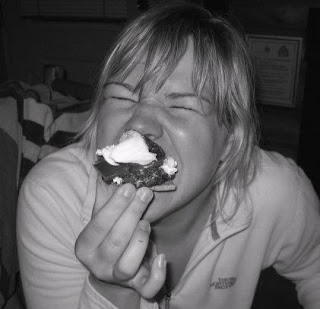Imagine for a moment, throwing together 19 people from all walks of life, putting them into a regimented routine for 10 weeks of intensive cultural and language training in an entirely different culture, then whisking them all away from each other to all corners of the country where they are asked to stick around for 3 months without traveling and absolutely no routine or regime. They attempt the language, try and find out where the work is, start questioning why they're there, and finally begin to get some sort of clue. Then imagine bringing them all back together again. It's more entertaining than a Real World Reunion. The people that thought Uganda wouldn't affect them have braids in their hair and have permanent Luganglish. The people that were attached to their homestay family and enjoying the "cultural immersion" are now the most jaded. Relationships that started during training have diminished and new ones start budding with other volunteers. Inside jokes seem to thrive within the language regions, but somehow, we all found each other back at square one- trying to figure each other out and accepting these changes. It's like summer camp and freshman year in the dorm all rolled into a different country. Then, after spending 14 days at each other's necks, out at the bars, and dodging sessions in favor of a scum-bottom swimming pool, we are all hurtled back to site squeezed into vehicles meant for 5 and holding 11 plus 2 in the trunk.
The reason I find this all blog worthy is this: finding the balance in Peace Corps- between the world you represent and the world you find yourself in is in constant flux. The trainings attempt to provide a forum for discussion and "development", but in the end, it feels like I was on a merry-go-round of American culture spinning with Ugandan culture, and then centripically projectiled far away from the epicenter, only to find myself back at site attempting to reconcile the differences. And that- to use another analogy- pretty much covers the first 6 months of Peace Corps, in a nutshell.
Thursday, January 31, 2008
Sunday, January 6, 2008
It's harder on the way down
 "Why do you want to climb the hill?"
"Why do you want to climb the hill?""To see what's on top"
"You muzungus are all the same, always wanting to get on top of things"
And with that exchange with a coworker (that could be taken out of text), I set out with a troupe of children to climb the hill behind my house. Of the three that were accompanying me, two had excellent English skills, and definitely had an opportunity to interrogate me on the journey. The third child, Sharifa, pictured above, is HIV positive and lives with her grandmother as both of her parents died from AIDS. I've often visited her home where her grandmother treats her not much better than a maid and she is always eager to please. I had invited her in my limited Runyankore on this hike, and she showed up wearing her Sunday best. She is at an innocent coming of age stage where she runs ahead, climbs a tree, but then as if she has remembered she's supposed to be a grown up, jumps down and smooths out her dress. Her English is very poor, and she's been held behind several grades, likely due to her sporadic attendance at school as she often needs to stay at home to care for her grandmother.
As the other two bantered away, Sharifa skipped ahead, kicking off her too small patent shoes to climb barefoot, as I struggled to keep balance in my $100 Chacos. She kept throwing back shy glances and smiles at me, often taking my hand to help me up rocks. As we passed through tall grasses, I pulled out my camera, which provided a whole new level of curiosity and fascination with the children. I taught them how to take photos of the town below, and we zoomed in on their various houses. Sharifa was delighted by this and began taking photos of everything, a cow we passed, banana plantations, a caterpillar. Each one, I saved, promising to print them out from Kampala. As we sat on the top of the hill, watching the sunset, we decided to head back down. Sharifa lagged behind, and I encouraged her to hurry before it became too dark, she mumbled something in Runyankore. I asked the other children to translate. "She doesn't want to go back" We coaxed her back down, promising to climb again, but still I wondered at the type of home situation where the top of a rocky hill at dusk would seem more enjoyable then your own home, a life where you take medication twice a day to fight a disease that took away both of your parents. At the bottom of the hill, Sharifa ran up, grabbed my hand, and pressed it to her cheek, when she pulled it away, my palm was wet, and I realized she had been crying. Then she ran off into the dusk on the road to her home and a childhood fading as fast as the setting sun.
There on the mountain bed of leaves, we learned life's reasons why,
The people laugh and love and dream, they fight, they hate to die. - Woodie Guthrie
Subscribe to:
Posts (Atom)

